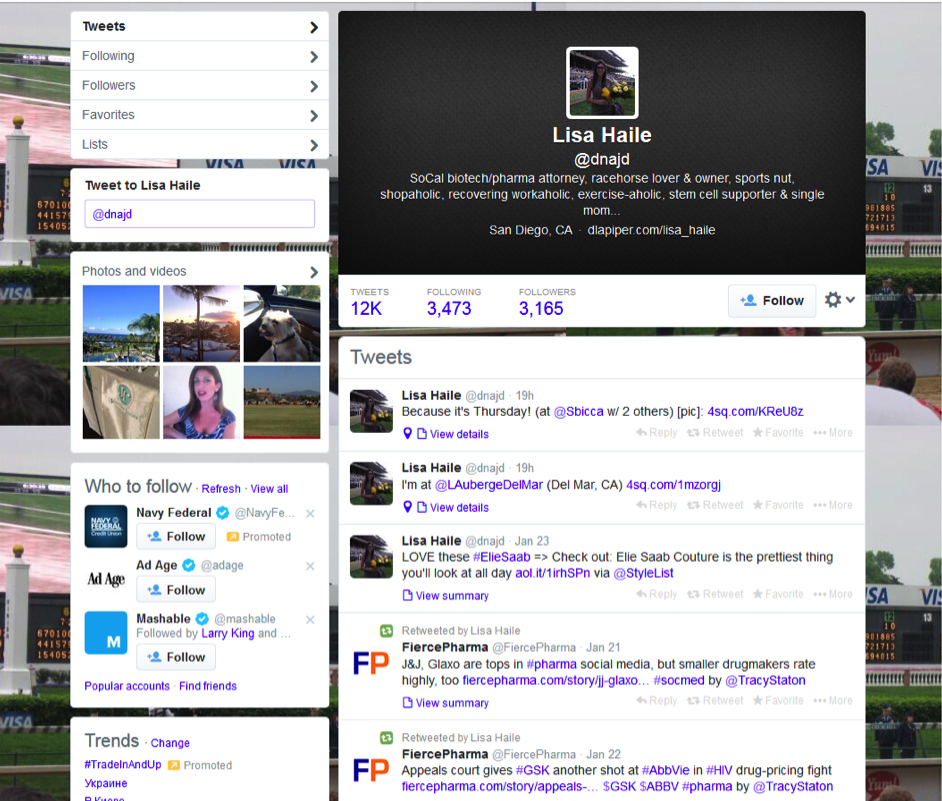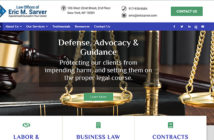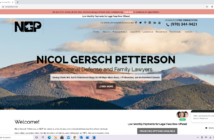How one patent lawyer and one injury firm use Twitter differently to pursue different outcomes. How they got started, and their results. [Yes, it is working for them.]
This case study reviews how two lawyers use Twitter to get more business from the social networking site. The two attorneys profiled are in completely different fields of law, so this will give any attorney looking to use the platform an idea of the best strategies, no matter their area of law.
Note that these attorneys use Twitter in different ways and pursue different outcomes. There is not one right way to use the social networking site as the attorneys profiled here demonstrate.
The two attorneys/firms we profiled are:

Dr. Lisa Haile is a Partner at DLA Piper. Her PhD in microbiology and immunology help her represent biopharma companies during patent disputes.

Zachar Law specializes in personal injury. We interviewed Joe Morales, director of marketing.
How do you use Twitter in your practice?
Dr. Haile connects with pharmaceutical companies using Twitter. She set up TweetDeck to track “various Biopharma feeds.” Using these feeds, she follows biopharmaceutical companies, and “review and retweet news of interest (e.g., clinical trial results; FDA approval of a drug; new lawsuits filed by or against pharma companies) on a regular basis.
Additionally, Dr. Haile will use the Twitter search function to find specific keywords that are relevant to her clients.
Zachar Law utilizes “Twitter in the sense of education marketing. It is really just to give out information to the public that they may not be aware of from a legal standpoint. Especially personal injury.” By educating prospects on the dangers of vehicles, or providing them with safety and legal tips (please note these tips are not from legal decisions), they create a connection with prospects who could use their services in the future.
Why did you decide to use Twitter as a platform to promote your practice?
Dr. Haile was introduced to Twitter in 2010 as a way to easily find news relating to intellectual property and biopharma. Additionally, she saw Twitter as a chance, “to brand myself as an expert in the legal field relating to stem cells in particular, which was a passion of mine. I went on Twitter, taking the name “dnajd” since I was a DNA lawyer, and began to see that Twitter was more than a social media — it was a valuable business development/branding media.”
Zachar Law: “The main reason we started using it is because it is a great way to reach the public with the countless users out there.” They employ Twitter to share the content from their blog, along with news relevant to prospects.
What has been the greatest benefit from using Twitter?
Dr. Haile has been using Twitter for almost 4 years. In that time, she has “established new business contacts, reinforced existing contacts, and established myself as a go-to lawyer by the media for certain types of legal and biopharma issues. Rather than email or telephone, I have had reporters contact me through Twitter for interviews after I had commented on certain current legal issues (e.g., the Myriad Supreme Court case on gene patents).”
In fact, she has picked up a few clients from Twitter. “Several in the biopharma space (companies), one VC fund looking for diligence on a stem cell company investment, and a musician who needed a contract reviewed (with a recording studio). I also received referrals from some of my followers in the biopharma space. Most of the work was early stage companies.”
Zachar Law: From a customer standpoint, “the ability to engage. What I mean by that is, Twitter is instant. If someone has a question on something specific, we can answer them pretty quickly.” Specifically for the firm, “no set number, but I can say at least from an analytical standpoint that because we engaged them on Twitter they went back to our website, and then went through the intake process to become eventual clients.”
What has been the biggest drawback?
Dr. Haile: “I don’t see a drawback to using Twitter that would be any different than using other internet sources for business development. One drawback would be if you relied on Twitter for all of your business development activities. I see Twitter as a supplement to more traditional business development activities, such as attending industry organization networking events. There is no substitute for in-person business development, so it would be a mistake to rely too heavily on Twitter alone.”
Zachar Law: “Time consumption, and the requirement to put hours into Twitter specifically. For instance, Twitter is a whole different platform which needs different specific content from Facebook.”
What would be the one thing you would tell attorneys to do if they were starting out with Twitter today?
Dr. Haile: “I would suggest making a plan and deciding how you want to brand yourself on Twitter before getting started. As I noted, for professional purposes I tend to stick with the biopharma industry and legal news relating to intellectual property or regulatory issues. Once you brand yourself in a certain sector or become identified as having expertise in a subject area (I started with stem cells), you begin to build a relevant follower base and gain traction.”
Zachar Law: “The key is to always be consistent. There are law firms that use it once or twice a week, I say use it as often as possible. Not just for clients, but also for SEO links. It is a very powerful tool. While our frequency varies, we tweet a minimum three times a day, seven times a week.”
What specifically does a lawyer need to know about using Twitter that other businesses might not think about?
Dr. Haile: “Two key issues that must be taken into consideration when using Twitter are conflicts and professional responsibility. I strongly suggest not commenting on tweets or articles relating to your clients, whether it is a positive or negative comment. I am comfortable retweeting tweets or articles related to the client, but if there is any possibility that your comments could affect a client or influence in any way an outcome, you should refrain from any comment when a client of the firm is involved.”
Furthermore she states, “Lawyers have a code of professional responsibility so each firm should have a social media policy that includes the obligations lawyers have to their firms and their clients to avoid any issues with tweets and comments on Twitter. In addition, once you become a member of the “Twitterverse”, everything you say or do reflects on you personally and professionally, and on your law firm. When you send tweets of a personal nature, keep in mind that you are on the internet and your comments (and attached photos) are open to public scrutiny.”
Zachar Law: “Nothing specific, because each state has their own code of ethics. Check out your own bar’s ethics.”
Conclusions
While the attorneys we interviewed use Twitter differently, they both found success by taking consistent action. Twitter is not a social network that you can succeed on in one week or even one month. Instead, you must continually create content, share relevant items, and engage.
Zachar Law focused more on how to create dynamic content that encourages prospects to go to their website. Dr. Haile, on the other hand, is interested in engaging with brands currently using Twitter for their business. She is not just waiting for them to contact her, she is also going after them. This is much easier to do using Twitter, because everyone is accessible on a public stage.
When using Twitter to increase your business, focus on how to connect with your target market. Whether that is through researching companies through the Twitter search feature or creating tweets that engage your network, do your homework, experiment, and find what works best for you and your firm.



